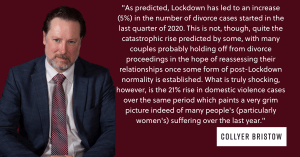- Family and divorce

Longer Reads
Growth journey’s end – When billionaires divorce
Head of Family Law, Toby Yerburgh, outlines the key considerations in respect of the Bill and Melinda Gates divorce.
3 minute read
Published 24 May 2021
Key information
- Specialisms
- Private Wealth
- Services
- Family and divorce
News of Bill and Melinda Gates’ divorce only surfaced once a deal had been done and every “i” had been dotted and “t” crossed in their no doubt mammoth and confidential settlement agreement. So the world never got to witness the months, and, perhaps years, of legal work in the background that went into fairly separating their estimated $160 billion of assets. While, in some ways, such divorces can be easier to manage than those where there is a minute fraction of that amount available for distribution, with every pound being bitterly fought over, such substantial divorces do throw up their own problems that require considerable experience to negotiate. Considerations that will be high on the agenda of any divorce lawyer advising in such a case include (but are by no means limited) to the following:
Jurisdiction
In the Gates’s case this might seem obvious as they both live in the US. But they, like many super-rich, have more than one home in different US states and countries all of which approach asset division on divorce differently. Jurisdiction needs to be determined before the case begins in earnest. So, forum shopping will be at the top of the agenda. This may, however, not just turn on whether one available jurisdiction is more generous/ mean than another but on the tax considerations consequential upon declaring that one place rather than another is your primary home. Forum can be determined by a pre-existing nuptial agreement, by subsequent agreement between the parties or by application to the court first seized of the matter. In England it is also possible to go one step further and, once jurisdiction has been determined, if there is a threat of attempts to litigate elsewhere the court can be asked to issue a Hermain Injunction preventing the other party proceeding elsewhere upon threat of seizure of assets. (One consequence of Brexit is that as between the UK and EU countries it is no longer the case that the court first seized of a matter automatically obtains jurisdiction.)
Pre or post nuptial agreements
Is there one? Or more than one in different jurisdictions? Is it enforceable? Is it enforceable in one jurisdiction but not another? Is it fatally flawed? Does it determine jurisdiction? Is it fair? All of these are the typical questions that will need to be determined pre-proceedings. And it is not unknown for post-nuptial agreement negotiations to slide into divorce when neither party can agree what is fair.
Asset identification
Does one spouse have a good idea of the other spouse’s assets and can they be easily determined? Is this a case where one spouse is likely to be forthcoming about their assets or is it going to be necessary to employ an army of forensic advisers to track assets down. If the former, the case may well be suitable for some sort of mediation or alternative dispute resolution and choice of mediator or tribunal will be key. If the latter, should one be considering ex-parte injunctions in various jurisdictions which need to be co-ordinated for maximum effectiveness requiring co-operation and liaison with multiple lawyers around the world? In such a case careful consideration needs to be given to the calibre and international experience of the lawyers instructed.
Asset valuation
Even if you know what the assets are how are you going to value them? Private companies, volatile assets (such as Bitcoin), trophy assets (such as Art, planes and yachts) can all be particularly difficult to value and will need specialist expert valuers (in England often, but not always, jointly appointed). Selecting and instructing such valuers then probing their opinions is a significant aspect of such cases.
Trusts
In the Gates’ case this will have been a significant feature of their case. Were they going to split their charitable trust or continue to manage it between them? They seem to have resolved this amicably, but this is not always the case and control of charitable and non- charitable trusts has become a substantial issue requiring detailed consideration of multi-jurisdictional trust law and the involvement of senior members of the chancery bar and their overseas equivalent. The English court’s powers to re-write trusts with a nuptial element is particularly attractive for those looking to benefit from a spouse’s assets protected in this way.
Tax
Not only will it be necessary to establish the overall tax liabilities of the couple and their uncrystallised tax liabilities before dividing their assets but, to the extent that they each get to keep or transfer certain assets, the tax ramifications of the transfers need to be thoroughly explored and understood in each jurisdiction.
Timing can also be extremely important (e.g, transfer before the end of a tax year, within a certain time after separation or before finalisation of the divorce.) The jurisdiction in which transfers of assets are made may also be highly significant.
Reputation
Want to announce to the world your “conscious uncoupling” or the fact that your growth journey as a couple has run its course? Don’t wait till news of your divorce seeps into the public domain and with it, speculation as to what might really have been going on. Divorce lawyers working hand in hand with international PR agents are not unusual in such cases. And agreed statements coupled with non-disclosure agreements are still very much part of the overall settlements when international billions are at stake.
This article was first published by EPrivateClient in May 2021.
Related content
Longer Reads
Growth journey’s end – When billionaires divorce
Head of Family Law, Toby Yerburgh, outlines the key considerations in respect of the Bill and Melinda Gates divorce.
Published 24 May 2021
Associated sectors / services
Authors
News of Bill and Melinda Gates’ divorce only surfaced once a deal had been done and every “i” had been dotted and “t” crossed in their no doubt mammoth and confidential settlement agreement. So the world never got to witness the months, and, perhaps years, of legal work in the background that went into fairly separating their estimated $160 billion of assets. While, in some ways, such divorces can be easier to manage than those where there is a minute fraction of that amount available for distribution, with every pound being bitterly fought over, such substantial divorces do throw up their own problems that require considerable experience to negotiate. Considerations that will be high on the agenda of any divorce lawyer advising in such a case include (but are by no means limited) to the following:
Jurisdiction
In the Gates’s case this might seem obvious as they both live in the US. But they, like many super-rich, have more than one home in different US states and countries all of which approach asset division on divorce differently. Jurisdiction needs to be determined before the case begins in earnest. So, forum shopping will be at the top of the agenda. This may, however, not just turn on whether one available jurisdiction is more generous/ mean than another but on the tax considerations consequential upon declaring that one place rather than another is your primary home. Forum can be determined by a pre-existing nuptial agreement, by subsequent agreement between the parties or by application to the court first seized of the matter. In England it is also possible to go one step further and, once jurisdiction has been determined, if there is a threat of attempts to litigate elsewhere the court can be asked to issue a Hermain Injunction preventing the other party proceeding elsewhere upon threat of seizure of assets. (One consequence of Brexit is that as between the UK and EU countries it is no longer the case that the court first seized of a matter automatically obtains jurisdiction.)
Pre or post nuptial agreements
Is there one? Or more than one in different jurisdictions? Is it enforceable? Is it enforceable in one jurisdiction but not another? Is it fatally flawed? Does it determine jurisdiction? Is it fair? All of these are the typical questions that will need to be determined pre-proceedings. And it is not unknown for post-nuptial agreement negotiations to slide into divorce when neither party can agree what is fair.
Asset identification
Does one spouse have a good idea of the other spouse’s assets and can they be easily determined? Is this a case where one spouse is likely to be forthcoming about their assets or is it going to be necessary to employ an army of forensic advisers to track assets down. If the former, the case may well be suitable for some sort of mediation or alternative dispute resolution and choice of mediator or tribunal will be key. If the latter, should one be considering ex-parte injunctions in various jurisdictions which need to be co-ordinated for maximum effectiveness requiring co-operation and liaison with multiple lawyers around the world? In such a case careful consideration needs to be given to the calibre and international experience of the lawyers instructed.
Asset valuation
Even if you know what the assets are how are you going to value them? Private companies, volatile assets (such as Bitcoin), trophy assets (such as Art, planes and yachts) can all be particularly difficult to value and will need specialist expert valuers (in England often, but not always, jointly appointed). Selecting and instructing such valuers then probing their opinions is a significant aspect of such cases.
Trusts
In the Gates’ case this will have been a significant feature of their case. Were they going to split their charitable trust or continue to manage it between them? They seem to have resolved this amicably, but this is not always the case and control of charitable and non- charitable trusts has become a substantial issue requiring detailed consideration of multi-jurisdictional trust law and the involvement of senior members of the chancery bar and their overseas equivalent. The English court’s powers to re-write trusts with a nuptial element is particularly attractive for those looking to benefit from a spouse’s assets protected in this way.
Tax
Not only will it be necessary to establish the overall tax liabilities of the couple and their uncrystallised tax liabilities before dividing their assets but, to the extent that they each get to keep or transfer certain assets, the tax ramifications of the transfers need to be thoroughly explored and understood in each jurisdiction.
Timing can also be extremely important (e.g, transfer before the end of a tax year, within a certain time after separation or before finalisation of the divorce.) The jurisdiction in which transfers of assets are made may also be highly significant.
Reputation
Want to announce to the world your “conscious uncoupling” or the fact that your growth journey as a couple has run its course? Don’t wait till news of your divorce seeps into the public domain and with it, speculation as to what might really have been going on. Divorce lawyers working hand in hand with international PR agents are not unusual in such cases. And agreed statements coupled with non-disclosure agreements are still very much part of the overall settlements when international billions are at stake.
This article was first published by EPrivateClient in May 2021.
Associated sectors / services
- Family and divorce
Authors
Need some more information? Make an enquiry below.
Subscribe
Please add your details and your areas of interest below
Article contributor
Toby
YerburghPartner - Head of Family Law
Specialising in Family & divorce
Enjoy reading our articles? why not subscribe to notifications so you’ll never miss one?
Subscribe to our articlesMessage us on WhatsApp (calling not available)
Please note that Collyer Bristow provides this service during office hours for general information and enquiries only and that no legal or other professional advice will be provided over the WhatsApp platform. Please also note that if you choose to use this platform your personal data is likely to be processed outside the UK and EEA, including in the US. Appropriate legal or other professional opinion should be taken before taking or omitting to take any action in respect of any specific problem. Collyer Bristow LLP accepts no liability for any loss or damage which may arise from reliance on information provided. All information will be deleted immediately upon completion of a conversation.
Close


















































